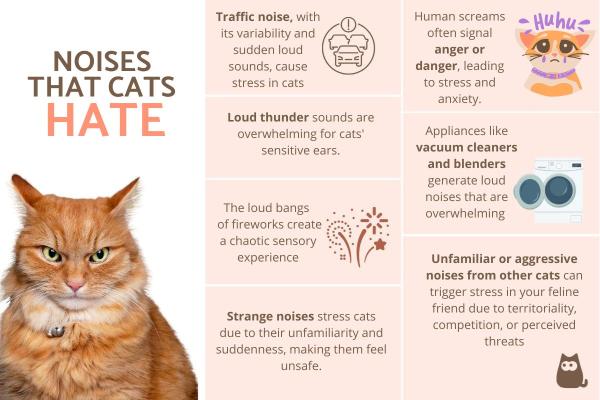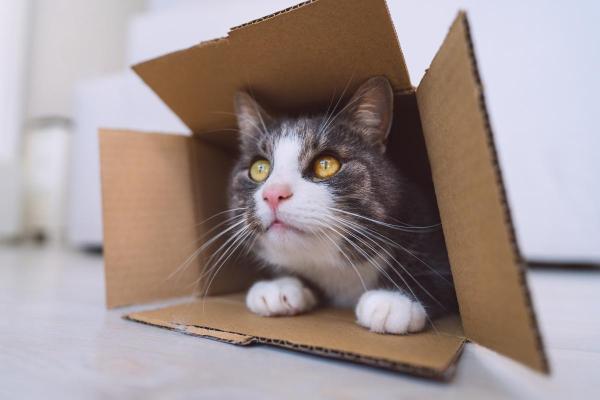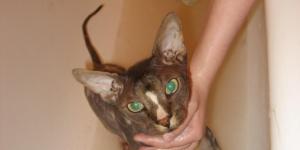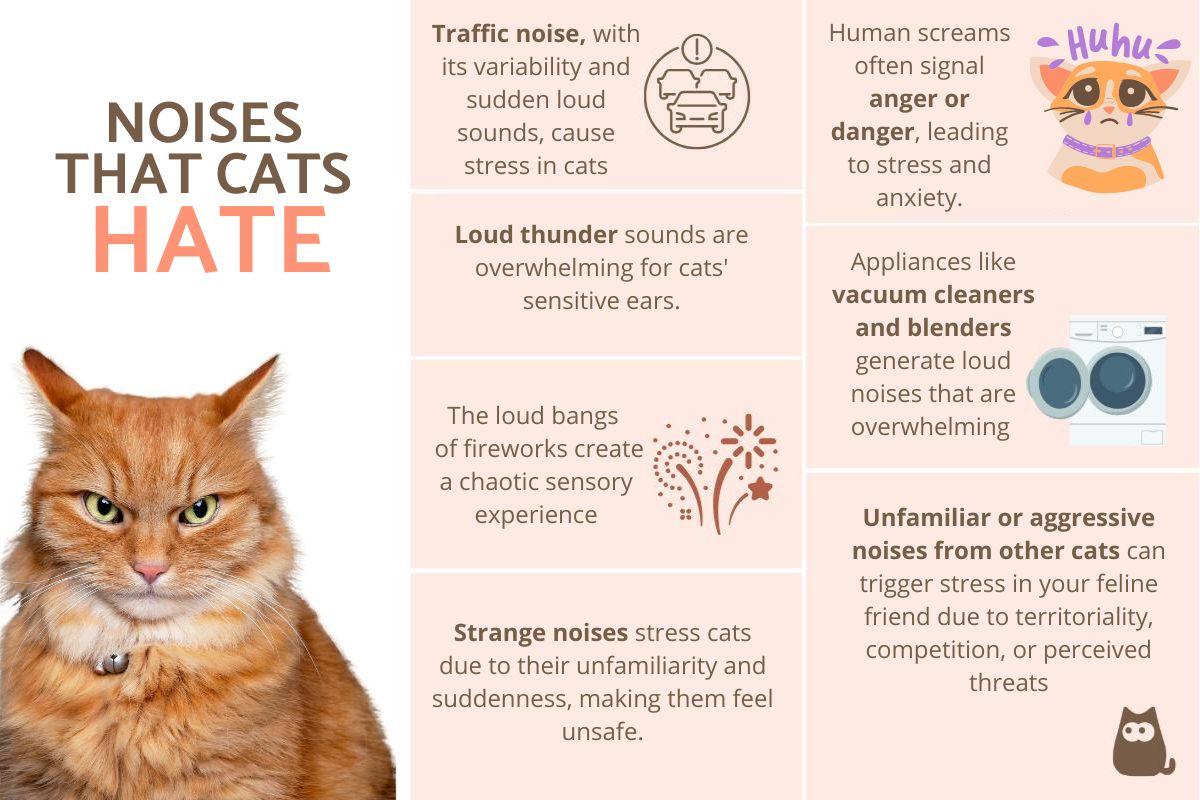What Noises Do Cats Hate?



See files for Cats
Ever wonder why your cat jumps at the vacuum cleaner or hides during a thunderstorm? Cats have far more sensitive hearing than humans, picking up on a wider range of frequencies that go unnoticed by our ears. This superpower can be a double-edged sword. Many everyday sounds we barely register can be overwhelming and even frightening for our feline friends.
In the following AnimalWised article, we'll explore the seven noises that cats hate and explain why these sounds can induce stress, fear, or defensive responses in felines.
Traffic noises
Cats possess exceptional auditory capabilities due to the unique anatomy of their ears. These specialized organs boast a remarkable number of muscles – 32 in total – compared to the mere six found in humans. This muscular advantage grants cats the ability to rotate their ears a full 180 degrees. This independent mobility allows them to precisely orient each ear or coordinate both towards a sound source.
Furthermore, cats exhibit a significantly broader hearing range than humans. While human auditory perception typically maxes out at around 20 kHz (kilohertz), cats can detect frequencies as high as 85 kHz.
This is why traffic noise can definitely bother some cats. Their acute hearing picks up on a wider range of sounds than humans, and the constant rumble, honking, and screeching of traffic can be stressful for them. Traffic sounds can fluctuate wildly, with loud horns or sirens piercing through the constant hum. These sudden changes can be startling for cats.
Want to learn how to identify stress in your cat? Check out this other article for the 5 main symptoms.
Thunders
The exceptional hearing of cats can also be a source of distress during thunderstorms. The sudden, loud cracks and booming sounds associated with thunderclaps are particularly overwhelming for their sensitive ears. Due to their broader hearing range, cats perceive a wider spectrum of frequencies within the thunderclap, making it even more intense.
Furthermore, cats may exhibit anxiety in response to the low-frequency rumbles and fluctuations in barometric pressure that often precede a storm. This sensitivity allows them to detect subtle changes in the environment that often go unnoticed by humans.
It's important to note that thunderstorms encompass a variety of stimuli beyond loud noises. Strong winds, heavy rainfall, and (in urban areas) increased traffic noise can all contribute to a cat's feeling of unease during a storm.
Fireworks
Similar to their reaction to thunderstorms, the exceptional hearing of cats makes fireworks displays a source of distress. The sudden, loud cracks and booming sounds associated with firework explosions are particularly overwhelming for their sensitive ears. Due to their broader hearing range, cats perceive a wider spectrum of frequencies within these loud noises, making them even more intense for felines.
Beyond the initial explosions, the unpredictable nature of firework displays adds to a cat's anxiety. The sporadic bursts of loud noises and bright flashes of light create a chaotic sensory experience. Fireworks, firecrackers, and other pyrotechnic displays can induce fear in cats. Regrettably, in numerous countries, these festivities are still linked with occasions like Carnival and New Year's Eve celebrations.

Sounds of other cats
Cats, like humans, come in all personalities. Some are social butterflies, while others are more reserved. Introducing a new cat, especially of the same sex, can be tricky due to these natural inclinations. As cats reach maturity, their instincts to mate and claim territory kick in. This is common across many animal species. In males, this can manifest as mounting, roaming, and spraying. Females may display similar behaviors, and both sexes may exhibit aggression towards rivals.
Certain vocalizations are clear signs of tension. Hissing, growling, and yowling signal aggression or fear. Your cat might respond defensively by hissing, puffing up their fur, or trying to escape.
Even if your cat lives alone, they can be affected by the presence of other cats nearby. Both males and females use vocalizations and pheromones (chemical signals) to advertise their presence and breeding status within their territory.
Worried about introducing a new cat? This article offers tips for feline harmony.
Screams
Cats have far more sensitive hearing than humans. Our screams, which might seem loud to us, can be excruciatingly loud and even painful for their delicate ears. This sensitivity to loud noises is just one reason why screaming is a sound that greatly disturbs cats.
But the discomfort goes beyond just volume. Screaming often carries negative emotional cues. Whether we're expressing anger, fear, or pain, cats can pick up on these subtle vocal changes. This can trigger stress and anxiety in them, as they perceive the situation as potentially threatening.
Beyond the emotional content, the sudden shift in volume and tone disrupts a cat's preference for a calm and predictable environment. Even if our intention isn't directed at the cat, a loud scream can be startling, especially if they're resting or relaxed.

Strange noises
Cats are renowned for their preference for routine and predictability. This extends to their auditory environment, where unfamiliar or sudden noises can trigger a stress response. This sensitivity is rooted in their evolutionary past, where a cautious approach to novel stimuli helped them avoid potential threats.
The sudden onset of unfamiliar noises can be particularly stressful for cats. The unpredictable nature of these sounds, coupled with an inability to identify the source, can lead to feelings of anxiety or even perceived threat.
Not only that, but some unfamiliar sounds may bear a resemblance to noises associated with danger in a cat's world, such as growling, hissing, or loud barking. This can trigger fear or defensive behaviors as a precautionary measure. For example, the barks and vocalizations of a newly adopted dog in the neighborhood can be unsettling for a cat. Dogs are often perceived as potential predators by cats, making their vocalizations a source of stress. This may lead to cautious behavior or hiding when a canine neighbor makes its presence known.
Furthermore, the presence of unfamiliar people can be a source of unease for some cats, prompting them to seek refuge in quiet spaces. If the visitors are particularly boisterous, with loud talking, excited laughter, or loud music, the disruption to the auditory environment can further exacerbate the cat's discomfort.
Household appliances
Cat's keen sense of hearing, as mentioned earlier, makes loud noises especially startling for cats. No wonder then that common household appliances like blenders, vacuum cleaners, and hair dryers disrupt their tranquility with their loud whirring and whooshing.
Even familiar sounds can be unsettling if introduced abruptly. Cats thrive on routine, so any unexpected loudness can trigger a stress response. This sensitivity can vary by individual cat – kittens are often more easily startled by new noises compared to older felines.
The good news is that cats can habituate to some sounds over time. However, during noisy activities, providing a safe haven for your cat to retreat to can significantly reduce their stress. This could be a quiet room, a designated hiding spot, or even a sturdy cat carrier.
If you want to read similar articles to What Noises Do Cats Hate?, we recommend you visit our Basic care category.







